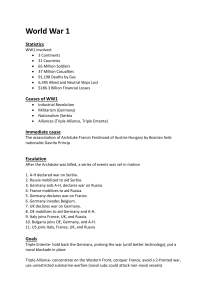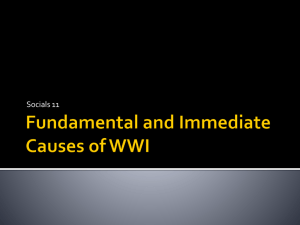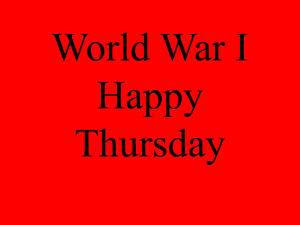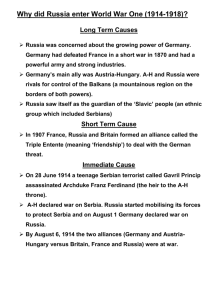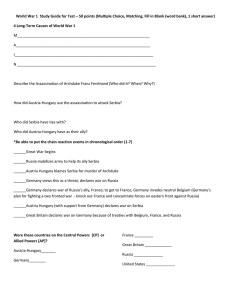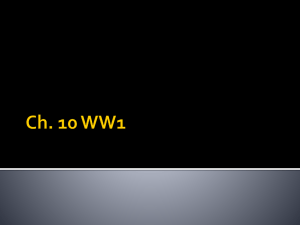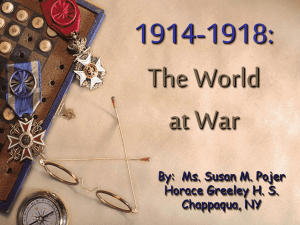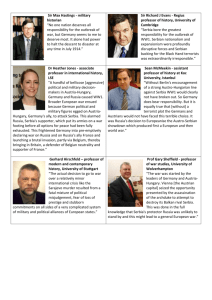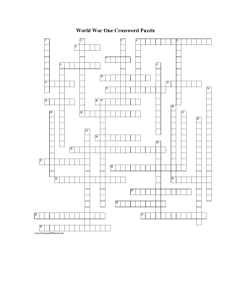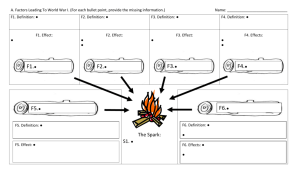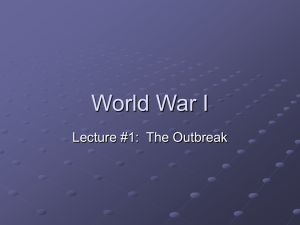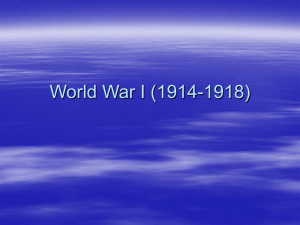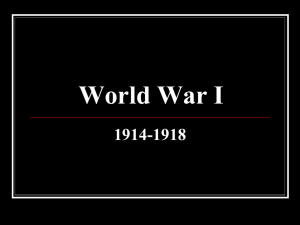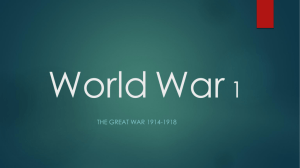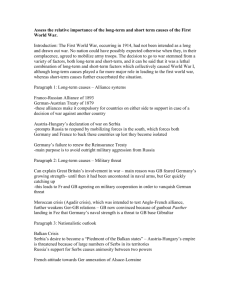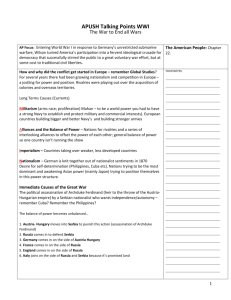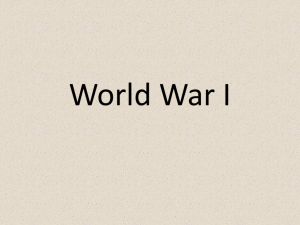WWI PPT
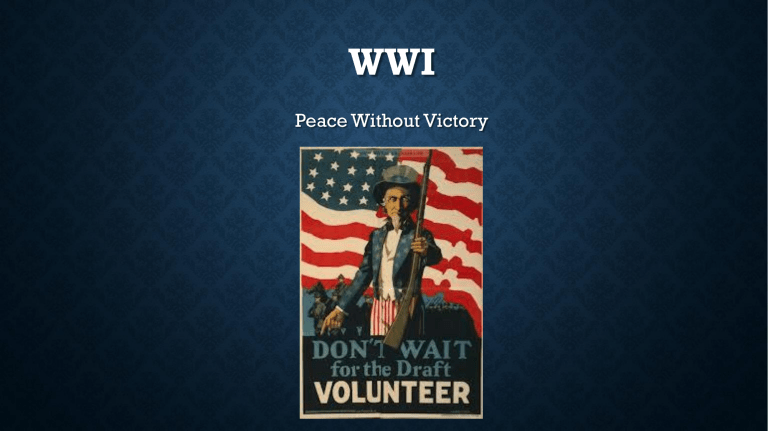
WWI
Peace Without Victory
TENSIONS
• Change in definition of “nation”
• increased since the 1870s
• Threat to minorities
• Destabilization of empires
• New measures of success
• Economic
• Competition in world
ALL RELATIVE…
• Kaiser Wilhelm cousin of King George V and Czar Nicholas II…
• Unrest: 1871 Germany takes Alsace-
Lorraine from France; France wants back
• Alliances had formed prior to 1914
• Triple Alliance: Germany, Austria-Hungary,
Italy
• Triple Entente: France, Russia, England
• During War:
• Central Powers: Germany, AH, Ottoman
Empire
• Entente (Allies): France, Russia, England
• Italy joined in 1915
TRAVELS END IN TRAGEDY
• Archduke Franz Ferdinand and wife Sophie
• Trip to Sarajevo (capital of province of Bosnia)
• Serbia had become independent 1878
• seen as threat to A-H
Empire (an example to other ethnic groups in
Balkans)
• Wanted to gain territory
(ethnic ties)
• Gavrilo Princip (1 of 6 total) – wanted to break off of A-H
1 SHOT = WAR
• Kaiser Wilhelm II of Germany
• Supports A-H
• Serbia doesn’t cooperate w/investigation
• 6/28/1914: Austria-Hungary declares war on Serbia
• Chain reaction of alliances…
1.Serbia
• Assassinates F. Ferdinand
• Wilhelm demands investigation
2.A-H
• Serbia doesn’t cooperate
• Declares war
3.Russia
• Comes to Serbia’s aid
4.Germany
• Declares war Russia
5.France
• Declares war on
Germany
6.Germany
• Declares war on
Belgium (neutral)
7.GB
8.US
• Declares war on
Germany
• Declares war on
Germany
A DIFFERENT KIND OF (LONG) WAR
• Trenches (450m of from Belgium coast to Switzerland)
• Defensive vs. Offensive
• “no man’s land” and “over the top”
• Weapons
• Machine guns (600 rounds in a minute)
• Long range artillery (caused most casualties)
• Poison gas
• Technology
• U-Boats
• Zeppelins
• Planes
NOT IT…
• Not our problem or business
• Tradition of keeping out of Euro problems
• ID as a melting pot (fear of American against American)
• Loyalties split
• 1/3 rd pop were immigrants
• Many German, Irish (hated British), Italian, Jewish (Russia persecuted)
• Native born population
• Ties to England (trade)
• Ties to France (helped with Rev. War)
• Benefiting by the increased demand for goods by both sides
COUNTRY DIVIDED, YET AGAIN
• Divided into 3 groups
• Isolationists
• Interventionists
• Internationalists
STRAWS IN THE
CAMEL’S BACK
• German invasion of Belgium
• German U-Boats used on merchant and passenger ships
• 5/7/1915 sunk British passenger ship Lusitania
• 1959 passengers
• 1198 dead
• 128 US
• English blockade of English Channel (war zone of
Atlantic; Med. Sea and Coast of Africa were also targets for U-Boats)
• Wilson remained against getting involved
• Begins preparations 1915
• Fear that this would make it worse
• National Defense Act and National Construction Act
• Reelected (1916)
• Trade was fine with GB and France
• Because of blockade, US was not trading with
Germany
• Zimmerman Note to Mexico
• 4/2/1917 Asks Congress for Declaration of War
• 4/6/1917 Granted
US ENTERS THE WAR
• Stalemate
• High casualties
• Tired
• Fear of commitment by US troops (diverse)
• U-Boats ramped up (more merchant ships)
• Allies implement convoys w/warships
• Japan involved in Pacific (anti-sub)
• General Pershing: commander of US forces in Europe
• 6/1917 small number of soldiers: “Doughboys”
• 1918 more: fresh vs tired Germans
RUSSIA BOWS OUT
• Unrest since 1905
• WWI put them against the Ottoman Empire = hurt trade routes
• Revolution 1917
• Provisional Government
• Leon Trotsky and Vladimir Lenin
• Bolsheviks take over
• Civil War until 1922
• Red Army (Bolsheviks) vs. White Army (Cossacks)
• Lenin pulls out 3/1918: treaty with Germany
• Won’t participate in war of imperialism
• Germany doesn’t have to deal with war on eastern front
IT’S OVER
• 11/11/1918 Germany surrenders
• 5 million Allied troops die
• 8 million Central Powers troops die
• 6.5 Civilians
• U.S. sent 1.3 million soldiers; 50k die; 230k wounded
WILSON AND PEACE
• “Peace without victory”
• Not imperialistic; about freedom
• 14 points
• Goal of openness in treaties
• Free trade
• Reduction in arms
• End colonialism/promote freedom
• League of Nations: place for countries to reach peace and secure independence
VERSAILLES TREATY
• 1919: Wilson is the 1 st president to attend a meeting like this
• Seen as idealistic; not an experienced diplomat
• Allies:
• Want reparations
• Want peace AND victory
• Alsace-Lorraine back to France
• Not ok with 14 points, but ok with League of Nations
• Territorial boundaries created that did not coincide with ethnic identities
• Africa, Balkans, Middle East
AMERICAN ISSUES WITH THE TREATY
• Germans: it’s too harsh
• Irish: no independence for Ireland
• Should have stayed out
• League of Nations: clause of alliance
• Meant US could go to war without ok of Congress
• Irreconcilables: anti-treaty
• Reservationists: Henry Cabot Lodge (Republican Senator, anti-Wilson, pro-Imperialism, anti-Treaty as a threat to Sovereignty)
WHAT WAS GOING ON AT HOME?
• Selective Service Act: Draft
• War Economy:
• New Federal Agencies
• Regulate food production, fuel, energy
• Free trade sacrificed for war effort
• War Industries Board
• Citizens told to conserve
EYE SPY…
• Espionage Act: Post office could ban “treasonable” mail
• Sedition Act: no anti-American speech (repealed 1920)
• Protestors, socialists, radicals included (jailed)
• Draft dodging
• Civil Liberties vs National Security
• Propaganda
• CPI
• Prejudice fueled
• Anti-German movement
CHANGING ROLES
• Women: 500k joined the workforce
• Could vote in some states (not nationwide until 1920)
• Women’s Hospital Service
• Army Corps of Nurses
• African Americans
• Great Migration: 400k left south for northern factory jobs
• 367k joined the military
• Hopes for equality at home, but not
• Hispanics
• Migration to south for jobs in agriculture (left by African Americans)
• Form barrios in CA
POST WAR: EUROPE
• German reparations = $5B in hard currency (don’t have it)
• Territorial disputes
• Soviet Russia: fear of worker revolutions
• No more monarchies
• Empires done
• England and France left weak
• US as a thriving power
POST WAR: US
• Economy: return of men meant shift in labor force for women and African Americans
• Red Scare starts
• Legacy of CPI/Espionage Act
• Republican Warren Harding elected in 1920: Return to “Normalcy”
• Rejects Wilson’s idealism
• Richest country/highest industrial output
• High demand for goods from Europe
• Creditor Nation
